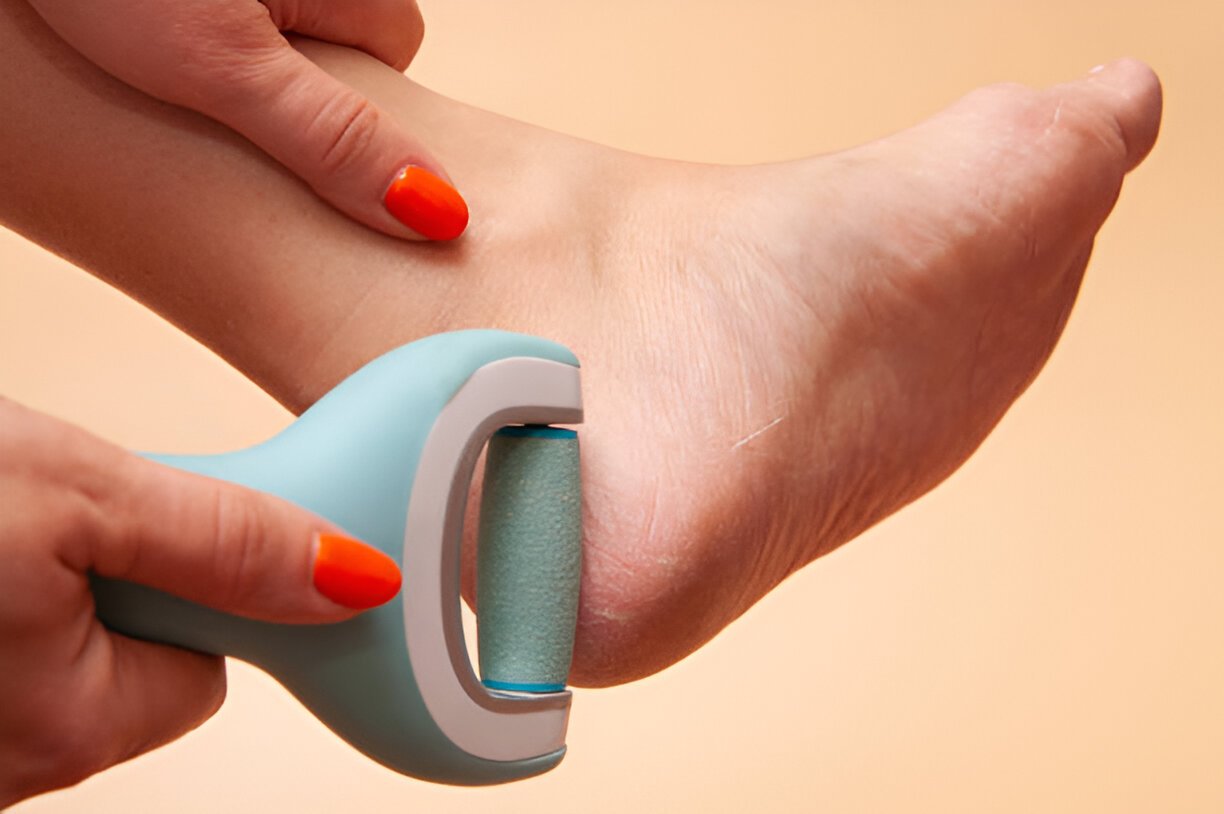
Image Credits: iStock Image
Achieving smooth, callus-free feet is a common desire for many, highlighting the significance of finding an effective foot callus remover. Calluses, though a natural response to friction and pressure, can become uncomfortable and unsightly, prompting individuals to seek solutions that provide relief and rejuvenation for their feet.
The quest for the perfect solution underscores the importance of the best callus remover, whether it’s for aesthetic reasons or comfort during motion. Addressing this need, the market offers a variety of options, from manual tools to electric devices and chemical treatments, each promising to remove callus on feet with varying degrees of success.
This article delves into the top foot callus remover available, breaking them down into categories for easier navigation: manual, electric, and chemical solutions. Each section, from the best manual callus removers that offer precise control to the latest in foot callus remover electric technology for efficient results, provides a thorough analysis. Additionally, it covers the best chemical callus removers that dissolve tough skin without manual labor.
Beyond the immediate task of callus removal, this guide also shares essential maintenance and prevention tips to keep feet soft and smooth, helping readers not only learn how to remove callus but also how to prevent their formation. Whether you’re in need of an electric callus remover, a foot callus remover machine, or tips on how to get rid of calluses on feet effectively, this comprehensive overview caters to all needs and preferences.
Best Manual Callus Removers
Foot files are a primary choice for safe and effective callus removal. The Footlogix file, with its fine and coarse grit, offers gentle to medium exfoliation, ideal for regular maintenance. It allows users to smooth rough patches quickly without over-scratching the skin. Alternatively, the Probelle foot file, made of nickel, provides a budget-friendly option though it may cause reactions for those with nickel sensitivities. For those preferring disposable options, stainless steel file kits with exfoliating stickers are available. These kits include both coarse and medium grit stickers, suitable for varying levels of callus build-up, and are easily replaceable for continued use.
Best Electric Callus Removers
Electric callus removers offer a convenient and effective solution for managing tough calluses. These devices typically feature rotating heads that buff away dead skin, enhancing foot smoothness and softness. It’s crucial to follow the manufacturer’s instructions to avoid injuries, starting with the lowest setting and gradually increasing intensity as needed. Top brands like Amope, Emjoi, and Microplane provide various models that cater to different needs and budgets. Notably, the Amopé Pedi Perfect stands out with its dual-speed settings and interchangeable heads, allowing for customized care. Always ensure the device is clean and avoid using it on sensitive or broken skin to maintain safety.
Also Read: Best Tinted Sunscreen: Protect and Perfect Your Skin
Best Chemical Callus Removers
For those seeking a potent solution, gel-based removers like Karlash Callus Remover quickly break down tough calluses, offering results in just minutes. This professional-grade product is highly effective, especially for individuals who are active or wear heels frequently. Cream-based options, such as PurSources’ foot cream with 40% urea, provide a gentler alternative, ideal for regular maintenance and can be used alongside manual files for stubborn areas. For a comprehensive treatment, foot peel masks like Patchology offer a unique approach by using a blend of AHAs and BHAs to exfoliate, typically resulting in significant peeling and smoothness within a week.
Maintenance and Prevention Tips
To maintain smooth feet and prevent calluses, follow these essential guidelines:
Regular Exfoliation and Moisturizing
Regularly exfoliate your feet to remove dead skin cells, using a pumice stone or foot scrub at least once a week. After exfoliation, apply a hydrating foot cream that contains ingredients like urea, shea butter, or glycerin to lock in moisture and keep the skin soft.
Choosing the Right Footwear
Select shoes that fit well and provide adequate support and cushioning. Avoid tight shoes and high heels that can increase pressure and friction on your feet. Consider using gel pads or custom orthotics to distribute weight evenly and reduce the risk of calluses.
When to Seek Professional Help
Consult a podiatrist if you experience frequent or painful calluses, especially if you have conditions like diabetes or poor circulation. A professional can provide appropriate treatments and advice on proper foot care to prevent complications.
Also Read: Best Lotion for Crepey Skin on Arms and Legs: Top Picks
Conclusion
Through a comprehensive exploration of the various solutions for combating foot calluses, from manual tools to electric devices and chemical treatments, this article underscores the array of options available to cater to different preferences and needs. The diverse selection ranging from manual files, such as the Footlogix and Probelle, to electric removers like the Amopé Pedi Perfect, right through to potent chemical removers including Karlash gel and PurSources cream, highlights the tailored approaches one can take towards achieving smooth, callus-free feet.
Emphasis on maintenance and prevention, aligning with essential footwear choices and regular foot care routines, illustrates the holistic approach required not just for callus removal but also for the ongoing health and comfort of one’s feet.
Understanding the significance of selecting the right callus remover empowers individuals to make informed decisions conducive to both the aesthetics and health of their feet. These revelations not only guide those afflicted with uncomfortable or unsightly calluses towards practical solutions but also emphasize the importance of prevention through proper foot care practices.
The discussion extends an invitation for further personal research and consideration, suggesting a proactive stance on foot health that integrates seamlessly with daily personal care routines. As we conclude, the encompassing review of callus removers alongside insightful maintenance tips serves as a foundational guide to sustaining soft, resilient, and healthy feet.
FAQs
1. What steps should I follow to achieve smooth calluses on my feet?
To treat corns and calluses and achieve smoother feet, follow these steps:
- Soak your feet in warm water to soften the corns or calluses.
- Use a pumice stone to gently file the corn or callus.
- Take care not to remove too much skin while filing.
- Apply a moisturizing lotion or cream daily to the affected area.
- Use padding to protect sensitive areas.
- Ensure your shoes fit properly to avoid excessive pressure on any part of your feet.
- Keep your toenails trimmed to prevent them from pushing against your shoes and creating pressure points.
2. What method do podiatrists recommend for removing large calluses?
For larger corns and calluses, podiatrists often use a surgical blade to carefully shave away the thickened, dead skin. This procedure is typically painless as it involves removing dead skin and can be performed in the podiatrist’s office. Sometimes, further treatments may be necessary if the corn or callus reappears.
3. Is it possible to permanently remove calluses from feet?
Yes, calluses on the feet can be permanently removed through a surgical procedure performed by a podiatrist. This is usually an outpatient procedure and is minimally invasive.
4. What technique is used by nail salons to remove calluses during a pedicure?
During a pedicure, nail technicians perform callus removal by using a foot file to reduce the thickness of the callus and smooth the skin. This process is often referred to as callus reduction, as completely removing calluses, especially on the heels and soles, is not typically necessary and some callus presence is normal.








